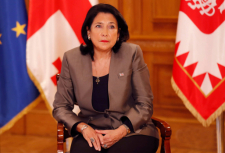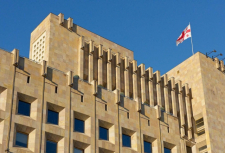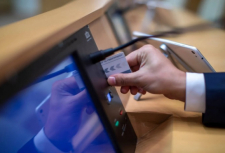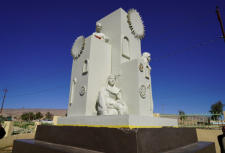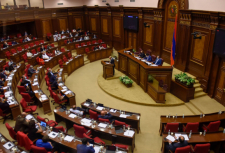Stolen Ezidi children in miracle return after ISIS genocide
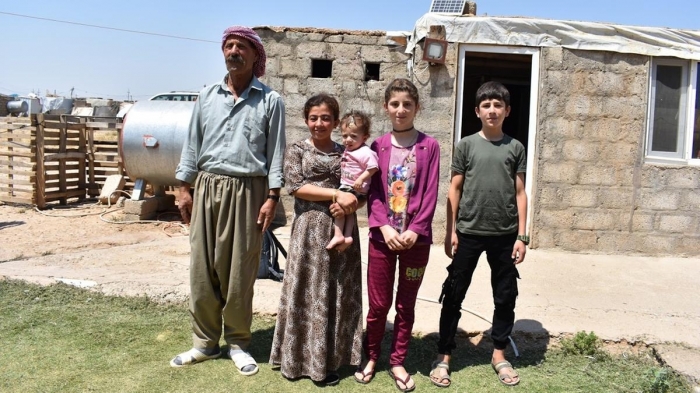
At the time four-year-old Rahima and her five-year-old brother Dawood were living with their parents on a smallholding by the edge of town tending to the family’s chickens and goats.
Their father, Salim, made extra money working as a labourer as they attended the local school.
Although the area was in the shadow of constant fear, their parents strived to give them a loving home. But there was worse to come in 2014 when ISIS terrorists invaded Sinjar to ravage, kill and kidnap thousands of Ezidis from their homeland.
Of the 6,800 abducted, a third were Ezidi children under 14 – including Rahima and Dawood, then nine and 10. Many of those taken were forced to be sex slaves and today 3,400 people remain unaccounted for.
Salim was working elsewhere but returned to find his home destroyed and his family taken.
For years he waited, fearing the worst. Then, a few months ago, as ISIS strongholds collapsed, Rahima and Dawood managed to escape.
Rahima was sold to an ISIS fighter for $500 (Dh1,836) and taken to his home, where she was forced to work as a maid for the man and his four wives.
Her brother has never spoken about his ordeal. Their mother has not been heard of since. Now they are living in a shack by Khanke camp near Dohuk.
When asked what she wishes for most, Rahima said:
“I hope that one day I will see my mother again.”
With the help of a British charity called the Amar Foundation, this family is one of many whose lives are gradually being rebuilt in a number of makeshift camps in northern Iraq.
Sadly, their story is a common one across the displacement camps. Amar is spending thousands of pounds a month on bringing medical aid and providing counselling and schooling for the victims.
Rahima and Dawood “were regularly beaten and fed little”, said Robert Cole, global head of communications at Amar. “As the end of ISIS came, they eventually managed to escape and were reunited with their father. Both are now having regular sessions with specially trained psychologists in our clinic, and are already responding to treatment.
“There are huge challenges to the rehabilitation of these children, though. Their devastating experiences have happened at the most vulnerable age.”
Amar relies on donations to keep the clinics running. It costs $15,000 a month, to provide medical care and disease control through vital vaccinations. It’s a cost that works out at just $1 per patient a month.
ezidi24
Tags:
Stolen Ezidi children in miracle return after ISIS genocide

At the time four-year-old Rahima and her five-year-old brother Dawood were living with their parents on a smallholding by the edge of town tending to the family’s chickens and goats.
Their father, Salim, made extra money working as a labourer as they attended the local school.
Although the area was in the shadow of constant fear, their parents strived to give them a loving home. But there was worse to come in 2014 when ISIS terrorists invaded Sinjar to ravage, kill and kidnap thousands of Ezidis from their homeland.
Of the 6,800 abducted, a third were Ezidi children under 14 – including Rahima and Dawood, then nine and 10. Many of those taken were forced to be sex slaves and today 3,400 people remain unaccounted for.
Salim was working elsewhere but returned to find his home destroyed and his family taken.
For years he waited, fearing the worst. Then, a few months ago, as ISIS strongholds collapsed, Rahima and Dawood managed to escape.
Rahima was sold to an ISIS fighter for $500 (Dh1,836) and taken to his home, where she was forced to work as a maid for the man and his four wives.
Her brother has never spoken about his ordeal. Their mother has not been heard of since. Now they are living in a shack by Khanke camp near Dohuk.
When asked what she wishes for most, Rahima said:
“I hope that one day I will see my mother again.”
With the help of a British charity called the Amar Foundation, this family is one of many whose lives are gradually being rebuilt in a number of makeshift camps in northern Iraq.
Sadly, their story is a common one across the displacement camps. Amar is spending thousands of pounds a month on bringing medical aid and providing counselling and schooling for the victims.
Rahima and Dawood “were regularly beaten and fed little”, said Robert Cole, global head of communications at Amar. “As the end of ISIS came, they eventually managed to escape and were reunited with their father. Both are now having regular sessions with specially trained psychologists in our clinic, and are already responding to treatment.
“There are huge challenges to the rehabilitation of these children, though. Their devastating experiences have happened at the most vulnerable age.”
Amar relies on donations to keep the clinics running. It costs $15,000 a month, to provide medical care and disease control through vital vaccinations. It’s a cost that works out at just $1 per patient a month.
ezidi24
Tags:
